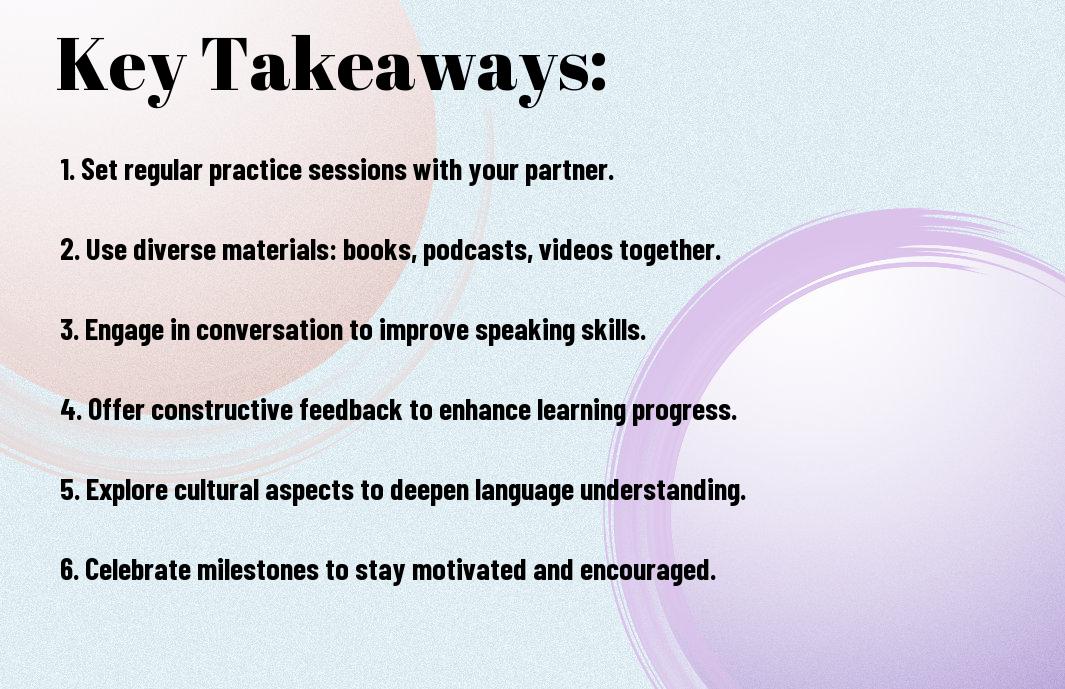As you launch on your language learning journey, you’ll find that having a partner can be incredibly beneficial. You’ll have someone to practice with, motivates you to stay on track, and provides support when you encounter challenges. Your partner can help you improve your speaking and listening skills, and you can learn from each other’s strengths and weaknesses. By learning a language with a partner, you can create a fun and engaging experience that will help you achieve your language goals more effectively.
Key Takeaways:
- Find a compatible language learning partner with similar goals and motivation to help you stay motivated and engaged in the learning process.
- Set realistic goals and schedules with your partner to ensure you both are on the same page and can track your progress together.
- Practice active listening and speaking with your partner, using authentic materials like videos, podcasts, or news articles to improve your comprehension and communication skills.
- Use language exchange activities like conversation practice, role-plays, and correcting each other’s mistakes to create a supportive and interactive learning environment.
- Make language learning a fun and engaging experience with your partner by trying new activities, playing games, and exploring the culture associated with the language you’re learning.
Setting Goals
Before you start learning a language with your partner, it’s necessary to set goals. You can learn How To Improve Your Relationship Through Language Learning by doing so. This will help you stay motivated and focused.
Defining Language Learning Objectives
Besides having a clear idea of what you want to achieve, you need to define your language learning objectives. You should identify what skills you want to develop, such as speaking, writing, or listening.
Creating a Study Schedule
An effective study schedule is vital to your language learning journey. You should allocate specific times for learning and practicing with your partner.
Setting a study schedule helps you stay on track and make progress. You can plan your lessons, set deadlines, and track your progress, which will help you learn a language with your partner more efficiently.


Choosing Resources
While learning a language with a partner, you’ll need to select the right resources to support your progress. You can explore various options, including textbooks, online courses, and language learning apps, to find what works best for your learning style and goals.
Language Learning Materials
For instance, you can start with textbooks, language exchange websites, or podcasts that cater to your level and interests, helping you and your partner stay motivated and engaged in the learning process.
Online Platforms and Tools
Beside traditional learning materials, online platforms offer a range of interactive tools and features that can enhance your language learning experience, such as vocabulary builders, grammar guides, and speech recognition technology.
Tools like language learning apps, online dictionaries, and pronunciation guides can be incredibly helpful in supplementing your lessons and providing you with additional practice opportunities, allowing you and your partner to track your progress and identify areas for improvement, and adjust your strategy accordingly to achieve your goals.
Establishing a Routine
For a successful language learning partnership, creating a routine is vital. You and your partner should commit to regular practice sessions, setting aside dedicated time to focus on language development.
Regular Study Sessions
Following the establishment of your routine, you’ll find that regular study sessions become the cornerstone of your progress. You’ll be able to track your improvement and stay motivated with your partner by your side.
Practicing Active Listening and Speaking
Once you have a routine in place, one of the most effective ways to improve your language skills is through active listening and speaking exercises. You can take turns conversing with your partner, focusing on pronunciation and comprehension.
Study with your partner by engaging in conversations on various topics, and you will see significant improvement in your language skills. You can discuss your daily activities, hobbies, or even watch a movie together in the target language, pause it, and then discuss what you’ve understood. This interactive approach will help you develop your speaking and listening skills, making you more confident in your abilities.
Overcoming Challenges
Once again, learning a language with a partner can be a fun and rewarding experience, but it’s not without its challenges. You can find more tips on how to navigate these challenges in an article about Do It for Love: Learning Your Partner’s Native Language, which will help you stay motivated and engaged in the process.
Managing Motivation and Burnout
Challenges to your motivation and energy levels are inevitable, but you can manage them by setting realistic goals and taking regular breaks to avoid burnout, allowing you to maintain your enthusiasm and interest in learning a language with your partner.
Dealing with Grammar and Vocabulary Challenges
Above all, grammar and vocabulary will be areas where you and your partner may encounter difficulties, as each language has its unique complexities and nuances, and you will need to work together to find ways to overcome these challenges.
Indeed, dealing with grammar and vocabulary challenges requires patience, persistence, and practice, as you and your partner will need to dedicate time to studying and reviewing the language together, using a variety of resources and activities to help you both stay on track and make progress in your language learning journey.
Enhancing Communication
Unlike learning a language alone, learning with a partner allows for more interactive and engaging experiences. You can visit 7 Tips For Learning A Language From Your Girlfriend or Boyfriend for more tips on how to make the most of your language learning journey with your partner.
Conversational Role-Playing
Among the various activities you can do with your partner, conversational role-playing is an excellent way to practice your language skills in a fun and immersive way, allowing you to simulate real-life conversations and scenarios.
Feedback and Correction
Enhancing your language skills also involves giving and receiving feedback, and with a partner, you can provide each other with constructive feedback and correction, helping you to identify and improve on your mistakes.
Consequently, you will find that your language skills improve significantly as you learn to communicate effectively with your partner, and you will be able to tackle more complex topics and conversations with confidence, and your partner will be able to help you refine your pronunciation, grammar, and vocabulary, leading to a more comprehensive understanding of the language.
Tracking Progress
Not having a system to track your progress can hinder your language learning journey with a partner. You need to establish a way to monitor your development and stay motivated.
Setting Milestones and Achievements
Along with regular practice, you should set specific goals and celebrate your accomplishments, allowing you to see how far you’ve come and what you still need to work on.
Reflecting on Language Learning Journeys
Achieving milestones in your language learning journey is exciting, and reflecting on your progress helps you identify areas that need improvement, enabling you to adjust your strategy and learn more effectively.
Due to the nature of language learning, you will encounter setbacks, but by reflecting on your journey, you can analyze what works best for you and your partner, making adjustments to optimize your learning experience and ultimately achieving your goals together.
Summing up
With this in mind, you can leverage your partnership to learn a language effectively. You will find that learning with a partner helps you stay motivated and accountable. Your progress will be faster as you engage in conversations, correct each other, and practice consistently. By following these tips, you will be able to improve your language skills and achieve your goals with your partner’s support and encouragement.
FAQ
Q: What are the benefits of learning a language with a partner?
A: Learning a language with a partner offers several advantages. It provides an opportunity for consistent practice, as you can engage in conversations, correct each other’s mistakes, and stay motivated. Having a partner also allows for the exchange of ideas, sharing of resources, and mutual support, which can make the learning process more enjoyable and effective. Furthermore, when you learn with a partner, you can divide tasks such as finding study materials, creating flashcards, and practicing speaking, which can make the process less overwhelming.
Q: How can I find a language learning partner?
A: Finding a language learning partner can be achieved through various methods. You can start by asking friends, family, or colleagues if they are interested in learning a language. Additionally, there are numerous online platforms and language exchange websites where you can connect with individuals who share your language learning goals. Social media groups dedicated to language learning can also be a great resource. Local language schools, community centers, and libraries often host language exchange events or know of individuals looking for a language partner. You can also post ads on local bulletin boards or online forums to find someone with similar interests and goals.
Q: What activities can my partner and I do to learn a language effectively?
A: There are several activities that you and your language learning partner can engage in to learn effectively. Regular conversations, either in person or online, are crucial for improving speaking skills. You can also watch TV shows or movies in the target language together and discuss them afterwards. Another activity is to take turns teaching each other new vocabulary, grammar rules, or phrases. Playing language learning games, such as quizzes or word games, can make the learning process more engaging. Furthermore, creating a schedule and setting goals together can help maintain motivation and track progress. Lastly, you can participate in language exchange events, join online language communities, or find a tutor to guide you and your partner in your language learning journey.
